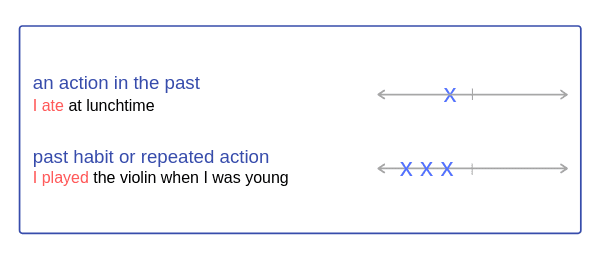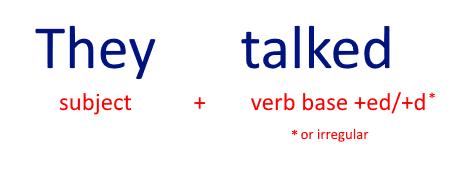Past Simple
timeline, form, uses

Past Simple uses are to talk about actions that started and finished in the past. It is also used to talk about past habits and repeated actions. Find explanations on the Past Simple timeline, form, uses below.
The Past Simple timeline is for actions in the past.
The Past Simple is also known as the Simple Past.
TO FORM THE PAST SIMPLE
The Past Simple is formed using :
– for the affirmative form: the verb base +d / +ed / irregular is used (see irregular verbs)
– for negative and interrogative forms: the auxiliary verb to do is used plus the verb base

affirmative: subject + verb base +ed / +d / irregular
the forms below use the auxiliary verb to do in the Past Simple (did):
negative: subject + auxiliary + not + verb base
question: auxiliary + subject + verb base
negative question: auxiliary + subject + not + verb base
Forms of the verb to wait:
affirmative
I waited
you waited
he/she/it waited
we waited
you waited
they waited
negative
I did not wait
you did not wait
he/she/it did not wait
we did not wait
you did not wait
they did not wait
questions
did I wait?
did you wait?
did he/she/it wait?
did we wait?
did you wait?
did they wait?
negative questions
did I not wait?
did you not wait?
did he/she/it not wait?
did we not wait?
did you not wait?
did they not wait?
CONTRACTED AUXILIARY VERBS
Auxiliary verbs are often contracted, especially in spoken and informal written language.
to do in the negative Past Simple did not, is contracted to didn’t
She didn’t go to the cinema.
Didn’t he read the book?
More on contracted auxiliary verbs
PAST SIMPLE USES
to express a situation that started and finished in the past, generally with the time indicated
I went to Paris last week.
Didn’t Steve wash his car yesterday?
She made cake.
with for – to express the duration of something in the past
They lived in Hong Kong for 8 years.
We waited for 2 hours for our train.
to express a habit which ended in the past (having a meaning of used to)
I sucked my thumb until I was 8.
When he was younger he played the violin.
to talk about past generalisations or facts that are no longer true
He didn’t like olives when he young.
People hated using kilos and grams at first.